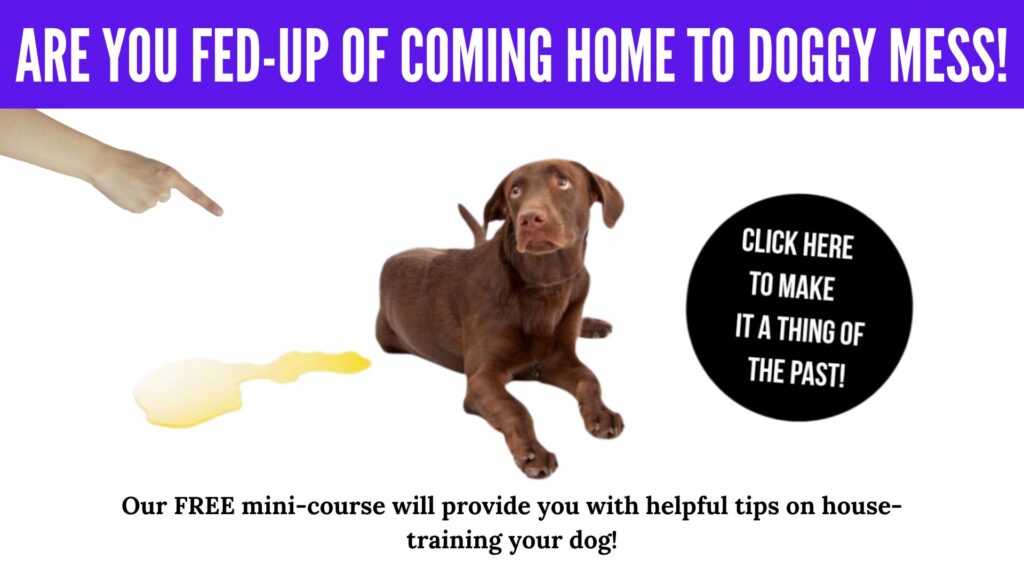Thank you for requesting your Free Guide “Bark-Free Bliss” – Unlock the Secrets to Quieting Your Dog’s Barking
Please check your email for a message from us – the title of the email will be “Thank you for requesting your free gift – Bark Free Bliss.
Don’t forget to check your spam or promotions folder in case it ends up there!
Wait….before you go
Is Your Dog Potty Trained Enough?

Is Your Dog Fully Potty Trained?
Embarking on the journey of dog ownership brings immense joy and companionship, but it also comes with its fair share of responsibilities. One of the most crucial aspects of pet care, especially for first-time owners, is mastering the art of dog potty training. Whether you’re welcoming a playful puppy into your home or providing a loving sanctuary for an adult dog, understanding the principles and techniques of effective dog potty training is essential. In this comprehensive guide, we’ll explore proven strategies, expert tips, and practical advice to help you navigate the challenges of potty training your canine companion with confidence and success.
Training a puppy or adult dog to adapt to house rules regarding elimination is a crucial aspect of pet ownership, and any valuable advice in this area can be immensely beneficial.
The initial step in cultivating good manners in your dog is to house-train them. While some may view this process as burdensome, I see it as an integral part of responsible pet care.
Click here to get our FREE potty training course and say goodbye to accidents!
Before delving into the specifics of potty training a puppy or adult dog, there are several key points to consider:
- Learning to read your dog’s body language is really important. Pay close attention to signs that indicate when your pet needs to eliminate.
- Puppies have more frequent bathroom needs, such as after waking up, short naps, playtime, meals, being crated, and before bedtime.
- Establish a consistent routine for bathroom breaks, taking your dog to the same spot each time.
- Reward your dog for eliminating in the correct location, reinforcing this behavior positively.
- Consider signal training to indicate when your dog needs to go out, such as using a bell near the door.
- Maintain close supervision until your dog is fully trained, preventing accidents in the house.
- Consider crate training, as dogs typically avoid soiling their sleeping area.
- For smaller dogs or for those without outdoor access, litter pan training may be an option.
- Use positive reinforcement methods during training, avoiding punishment which can lead to negative associations.
- Be prepared for accidents, especially if leaving your dog alone for extended periods.
- Address territorial marking behaviors promptly with appropriate deterrence methods.
- Patience is key, as house training can take time and consistency.
Moving forward, let’s discuss methods for potty training puppies and adult dogs separately.
Potty Training a Puppy:
Housetraining a puppy is often considered a significant challenge for dog owners, regardless of the breed. Simply providing newspapers for elimination spots may not suffice.
Puppies typically lack full bladder control until around 4 to 5 months old, necessitating frequent bathroom breaks.
Click here to join our FREE potty training course and stop the mess!
After each nap, meal, drink, or play session, take your puppy to the designated elimination area and remain there until they’ve relieved themselves. Then, return them to their crate.
Consistency is crucial in establishing this routine until it becomes a habit.
Adult Dog Potty Training:
Re-training an adult dog may require starting from scratch.
Close observation of your dog’s elimination patterns is essential, noting when and where accidents occur.
Introduce crate training gradually if necessary, ensuring your dog feels comfortable with the process.
Remember, commitment, consistency, and positive reinforcement are key to successful housetraining. While results may not be immediate, perseverance will yield positive outcomes over time.
For further guidance on potty training your dog, consider enrolling in our free course.
Click here to enroll in our FREE house-training course today!
By following these guidelines and utilizing effective training techniques, you can become the proud owner of a well-behaved, housetrained dog. Expectations of instant results may lead to disappointment, so patience and dedication are paramount.
Take advantage of our free course on potty training for additional support. Start housebreaking your dog today with our comprehensive guide.
Effective Dog Accident Cleanup
Efficiently managing dog accidents is crucial for maintaining a clean and hygienic home environment. With the right approach, dealing with these incidents can be hassle-free. Prompt cleanup not only ensures a fresh living space but also helps in reinforcing positive potty training habits for your furry friend. Utilizing appropriate cleaning products and techniques tailored for pet messes can effectively eliminate stains and odors, preventing reoccurrence. By staying prepared and proactive, pet owners can swiftly address accidents and maintain a harmonious living space for both themselves and their beloved companions.
Click here for expert potty training tips in our FREE course!